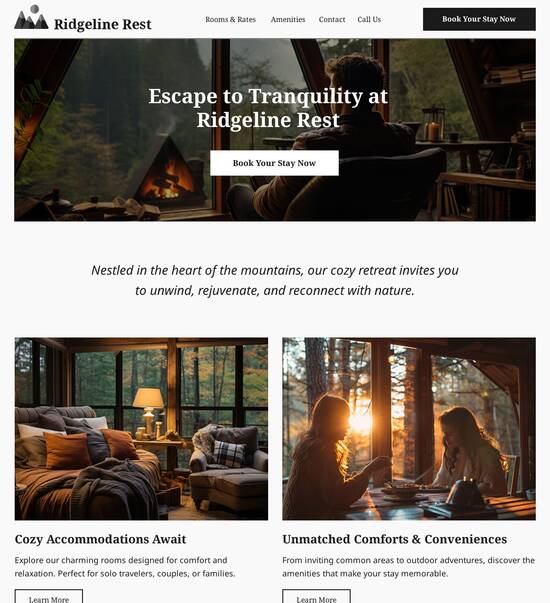
HTML page template for Agents
Use TemplateAbout template
Attract clients and showcase your skills with style using our landing page templates for Agents. Let's convert those visitors into clients!
Recommended templates

Easy to build without coding
With the intuitive drag-and-drop builder, anyone on your team can create high-converting pages without any knowledge of code or design. Make enhancements to your landing page with custom widgets using Javascript, HTML/CSS, or third-party scripts.

Multiple layouts for any industry and goal
Select from 500+ landing page layouts built to boost conversions across industry-specific scenarios. Customize them by adjusting fonts, adding images, and generating on-brand content with the AI assistant. Quickly scale with Instablocks® and Global Blocks that you can save, reuse, and update globally.

Loads fast and looks polished on any device
Every template is responsive, which means they present professionally on any device and load blazingly fast with our Thor Render Engine. You can also power them up with Google AMP technology to deliver an unparalleled mobile experience and drive higher conversions.

Robust analytics & experimentation
Get real-time updates and reporting across all your devices, showing the number of visitors, conversions, cost-per-visitor, and cost-per-lead. Launch AI-powered experiments, run A/B tests, and use heatmaps to analyze user behavior, then optimize your landing page to maximize conversions.







Easy to build without coding
With the intuitive drag-and-drop builder, anyone on your team can create high-converting pages without any knowledge of code or design. Make enhancements to your landing page with custom widgets using Javascript, HTML/CSS, or third-party scripts.
Multiple layouts for any industry and goal
Select from 500+ landing page layouts built to boost conversions across industry-specific scenarios. Customize them by adjusting fonts, adding images, and generating on-brand content with the AI assistant. Quickly scale with Instablocks® and Global Blocks that you can save, reuse, and update globally.
Loads fast and looks polished on any device
Every template is responsive, which means they present professionally on any device and load blazingly fast with our Thor Render Engine.
Robust analytics & experimentation
Get real-time updates and reporting across all your devices, showing the number of visitors, conversions, cost-per-visitor, and cost-per-lead. Launch AI-powered experiments, run A/B tests, and use heatmaps to analyze user behavior, then optimize your landing page to maximize conversions.
All the features you need to build lead-generating landing pages
Explore more featuresLearn how to build top-performing landing pages for any goal
FAQs
Leading the way in building high-performing landing pages





A comprehensive guide to using Instapage for your landing page and CRO needs
With a focus on optimizing your digital marketing results, Instapage provides a robust platform for marketers across various sectors in the USA. This guide will walk you through the features and functionalities of creating effective landing pages using Instapage, which significantly enhances campaign performance and maximizes ROI.
Understanding the power of Instapage
Instapage stands out as an all-in-one solution designed for marketers wanting to create high-converting landing pages. Its user-friendly interface allows you to build landing pages within minutes, ensuring you can capture leads and drive desired actions without needing developer support. This efficiency is critical for teams within business services, education, financial services, and more.
- High-converting templates: Choose from over 100 ready-to-use templates tailored for various industries to jumpstart your campaigns.
- Intuitive page builder: Easily customize your pages with drag-and-drop functionality, enabling users of any skill level to produce professional-looking results.
- Lead generation elements: Incorporate pre-built elements like forms and buttons that enhance the lead capturing process.
Getting started with landing page creation
The first step in leveraging Instapage is to select a template that resonates with your campaign goals. Follow these steps to initiate your page creation:
- Choose a template: Identify a high-converting template that aligns with your goals, whether promoting a service or capturing leads.
- Customize content: Edit texts, images, and colors to match your brand identity and messaging.
- Integrate lead capture forms: Utilize the platform's integrated forms and lead generation elements to gather visitor information seamlessly.
Optimization for better performance
After launching your landing page, it’s important to monitor its performance and optimize where necessary. Here are key features for optimization in Instapage:
- A/B Testing: Run experiments to compare multiple versions of your landing pages to identify which configurations yield the best results.
- Heatmaps: Analyze user behavior on your pages to understand where visitors are clicking and how they are interacting.
- Analytics dashboard: Use the real-time analytics offered by Instapage to assess performance metrics and make informed adjustments.
With a thoughtful approach to creating and optimizing landing pages, you can enhance overall marketing campaign effectiveness through Instapage.
To maximize your marketing ROI with Instapage, it's important to continually assess and iterate on your strategies. Regularly updating your landing pages with fresh content tailored to your audience will keep your campaigns relevant and engaging.
Get started today with Instapage to transform the way you manage and optimize your landing pages. Experience the power of leading-edge marketing tools designed to elevate your campaigns.
People also ask about HTML page template for Agents
HTML page templates for agents: A comprehensive guide
The evolution of HTML page templates for agents
HTML templates have come a long way since their inception in web development. Initially, they served as simple frameworks to display content on web pages. As the internet evolved, so too did the design and functionality of these templates, giving rise to specialized structures such as landing pages and dashboards tailored for various industries, including real estate, insurance, and services for agents.
Over the past two decades, the demand for HTML page templates has increased significantly. Agents in sectors like real estate and insurance began to recognize the potential of landing pages as a means to capture leads and display vital information. These dynamic tools contributed greatly to agents' strategic marketing approaches, further underscoring the importance of customizable templates.
The customization and flexibility of HTML templates reflect the evolving needs of today's agents. They are no longer satisfied with static, one-size-fits-all solutions. Instead, they favor templates that facilitate personalization, allowing them to engage potential clients effectively and stand out in a crowded marketplace.
Understanding Bootstrap and its impact
Bootstrap is a powerful front-end framework that has revolutionized the way developers create responsive web designs. Initially developed at Twitter, Bootstrap now offers a plethora of tools and components that streamline the development process, allowing users to build responsive, mobile-first applications quickly. The framework features a comprehensive grid system that aids in crafting structured layouts, ensuring that web pages not only look visually appealing but also operate seamlessly across devices.
For agents looking to design HTML page templates, Bootstrap provides significant benefits. The predefined grid system allows developers to create adaptable layouts that can accommodate various screen sizes, an essential feature given the prevalence of mobile browsing. Furthermore, Bootstrap's access to numerous UI components, such as buttons, drop-downs, and modals, enhances the functionality of agent templates, enabling users to deliver rich user experiences.
Key features of HTML page templates for agents
When it comes to HTML page templates for agents, versatility is a key feature. In particular, dashboard templates allow agents to monitor their performance effectively. These dashboards can be highly customized, presenting real-time analytics and performance metrics that inform decision-making. For agents managing multiple properties or clients, a well-designed dashboard template can be invaluable.
Customizable dashboards that focus on individual KPIs.
Integration of third-party analytic tools to track engagement.
Visualization of data trends to spot opportunities quickly.
Dynamic landing pages also play a crucial role in lead generation. These pages should not only capture user information but also guide visitors through the conversion funnel. Techniques like strategic copywriting, compelling visuals, and effective call-to-actions work together to drive conversions. A successful landing page is crafted with the end-user in mind, delivering an experience that encourages contact or further exploration.
Crafting beautiful business website templates
Aesthetics play a crucial role in an agent's success online. Sites with clean, professional designs attract clients and establish credibility. Elements such as color schemes, typography, and visuals should be selected with intention, as they contribute to the overall user experience. A well-executed design resonates with potential clients and can significantly influence their decision to engage your services.
Furthermore, templates tailored to specific needs ensure that agents are accurately showcasing their services. For instance, real estate agents may require property showcase templates, while insurance agents may need to highlight their insurance plans and options. Customizable portfolios can also serve to display successes and testimonials, solidifying trust among potential clients.
Maximizing functionality with content modeling
Content modeling is an essential aspect of template design, particularly for agents seeking to provide a seamless user experience. By organizing information thoughtfully, agents can ensure that users find what they need quickly and effortlessly. This is especially important in industries where timely access to information can convert a casual visitor into a committed client.
Define clear categories for different services offered.
Implement user personas to streamline content delivery.
Regularly update content models for relevance and accuracy.
Integrating dynamic content based on user interactions and preferences can also enhance website functionality. This approach not only allows agents to tailor their messaging but also aligns with the increasing demand for personalized experiences. Taking these steps can significantly improve user engagement and satisfaction.
Projects: From concept to execution
Utilizing HTML templates effectively requires a strategic approach. Begin by defining project goals and requirements. Identify the target audience and understand their needs, as this will influence your template selection. For agents, choosing a template that aligns with their brand identity while being functional is essential to establishing a strong online presence.
Establish clear objectives for your website or landing page.
Research suitable template options based on your niche.
Customize the template to reflect your branding.
Case studies of successful agent websites often showcase innovative uses of HTML templates. Notably, these sites highlight how tailored approaches lead to measurable business growth and improved client engagement, providing valuable insights for those entering the field.
User interface design for apps and dashboards
User experience (UX) and user interface (UI) design are critical factors in retaining clients. For agents, designing intuitive interfaces that facilitate navigation significantly impacts how users interact with an application or dashboard. A streamlined experience tends to keep clients returning, fostering brand loyalty.
Prioritize usability by reducing clutter and enhancing navigation.
Utilize color contrast for readability and visual appeal.
Incorporate feedback loops for continuous improvement based on user feedback.
Integrating templates into app development can accelerate the process significantly. Responsive design ensures that applications function well across various devices, which is essential as more users rely on mobile solutions. This approach not only saves time but also improves overall functionality and user satisfaction.
Harnessing templates for startups
For startups operating on a tight budget, quick deployment of a professional web presence is crucial. HTML templates provide an affordable solution, enabling these businesses to establish their brand identity without extensive investment in development. This is particularly beneficial in competitive industries where time and first impressions matter significantly.
Utilize pre-designed templates to save on design costs.
Adapt templates to reflect your unique brand voice.
Leverage optimization tools to enhance landing pages.
Moreover, HTML templates can enhance startups' credibility. A polished, professional appearance builds trust with potential clients. Engaging clients through effective landing pages is another critical aspect, as these serve as the first point of contact with the target audience.
Future trends in HTML page templates for agents
As technology continues to advance, the landscape of HTML page templates for agents is also evolving. One notable trend is the rise of no-code solutions, which have made creating and customizing templates accessible to those without technical backgrounds. This democratization of design allows agents to take full control of their online presence without relying on developers.
No-code platforms simplify the template creation process.
Increased accessibility fosters innovation within the industry.
AI-driven customization features represent the next frontier.
Looking ahead, mobile-first design will continue to be of paramount importance. As more consumers browse and shop via mobile devices, ensuring that HTML templates are designed with mobile users in mind will remain a priority for agents aiming to stay relevant in this rapidly changing market.
Best practices for implementation and optimization
Implementing HTML page templates effectively involves several best practices. One vital approach is ensuring brand consistency across multiple platforms, as inconsistency can confuse potential clients and diminish trust. By adhering to established branding elements such as color schemes and typography, agents can create a harmonious experience that reinforces their identity.
Ensure all pages reflect your brand identity and message.
Conduct regular A/B testing on landing pages.
Utilize SEO-friendly coding practices for better visibility.
Optimizing performance and load times is equally essential. Slow loading pages can deter potential clients and negatively impact search engine ranking. Tools and resources are available to monitor template performance, ensuring that any issues can be addressed promptly. Staying proactive in performance management will ultimately enhance user experience and drive conversions.
Ready to skyrocket conversions?
Supercharge your ad campaigns with high-performing landing pages
Get started














